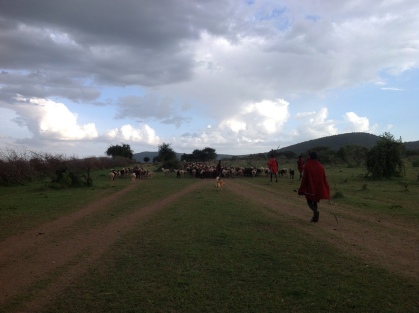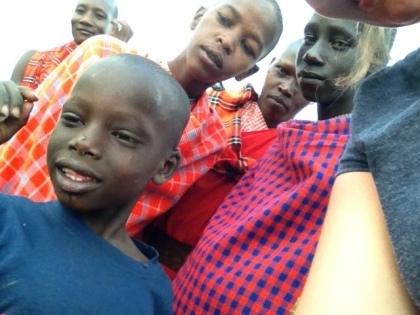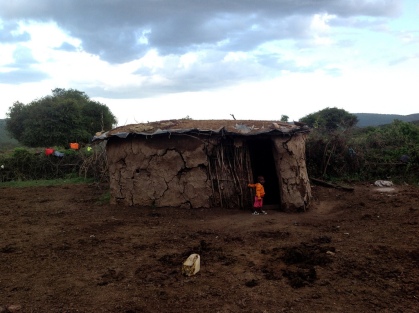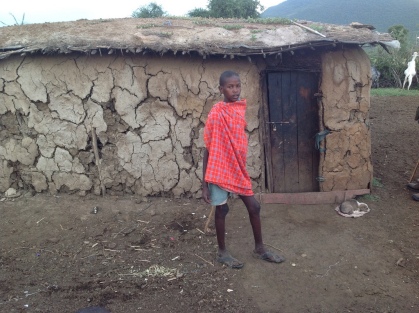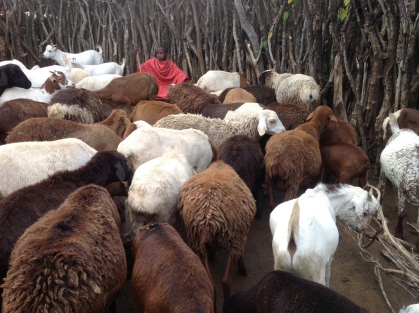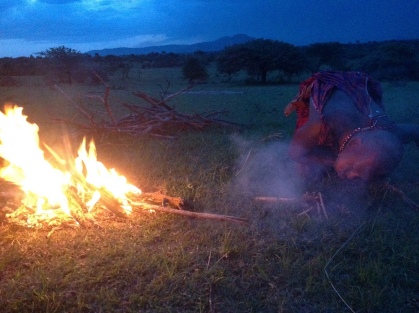Filed under: Uncategorized | Tags: election, politics, post-election violence, violence
In Nairobi, four days before the election, the tension is palpable.
The city is blanketed with scrawled graffiti and an endless repetition of low-budget political posters, one stiffly posed smiling man indistinguishable from the next. On street corners and in parking lots, trailer trucks wallpapered with campaign stickers blast deafening music to rally supporters. (The purpose of these so-called rallies remains unclear, as most of the gathered crowd can be seen sitting on the ground, eating ugali and drinking soda, and looking utterly bored.) In shop windows, typed notices inform customers of upcoming closures “due to elections” – some, hopeful, announce closures of only one day to coincide with the official holiday, but many others, less optimistic, announce closures of a week or more.
In coffee shops and mutatus, grocery store queues and board rooms, there is only one topic of conversation – and one question being asked: will there be violence? Or, more pointedly, how bad will it be this time? On this topic, opinions vary widely – no one wants a repetition of the 2007-2008 disaster, when close to a thousand people were killed, hundreds of thousands displaced, and the country plunged into social and economic chaos that continues to reverberate today. But whether or not enough time has passed, and enough change has occurred, to ensure that this election remains peaceful is a contentious debate.
“We Kenyans have learned from our mistakes. What happened last time will not happen again,” my taxi driver assures me. But what about the reports of machetes being bought in droves from supermarkets? A pause. “Better to be prepared this time. Just in case,” he says.
Despite the mounting hysteria, evinced mostly by foreigners, aid workers, and ex-pats who are fleeing the country in advance of the election and following melodramatic “emergency preparedness” decrees (“prepare a ‘go bag’ with emergency supplies including dental records, power of attorney, moist towelettes, and a signaling whistle”) the majority of Kenyans seem cautious but hopeful that this will be a relatively peaceful election.
The world is watching, this time around. But whether or not that will be enough to stop history from repeating itself remains to be seen.
We leave camp in late afternoon, stepping on the lengthening shadows of acacia trees and smearing the sandy footprints of impalas beneath our boots. The air is filled with birdsong, the chirps and trills of families beckoning each other home before nightfall, to safe, warm nests. On a grassy hill nearby, a gazelle raises its slender neck and watches us warily; as our footsteps fade into the distance, he senses that potential danger has passed and gracefully lowers his head, midnight eyes disappearing into the tall grass.
As we walk east, toward the village, the rhythmic clang of cowbells crescendos and carries across the savannah on a breeze. Nestled in these hills are hundreds (thousands?) of herds of cattle, goats, and sheep, all plodding home as dusk darkens the clouds. Beside each herd, a Maasai shepherd, swathed in fiery red cloth and clasping a whip of twine, guides the pack back to the village they left at sunrise. Tonight, the animals will sleep soundly, safely guarded from intrepid leopards and lions by a towering fortress of tall branches – a circle within a circle. When the stars fade into clouds tomorrow morning, they will leave home once again.
This is the refrain of life here in the Maasai Mara, day after day. The verses of weather and season may vary, but the melody remains constant.
We reach the village as twilight darkens the horizon. Following a meandering herd of goats through a gap in the perimeter of the enclosure, we duck beneath spiky branches and stand, watching, as a dozen boys push their way through the protesting herd towards us. Barefoot and wide-eyed, they rush up near us and then abruptly stop a few feet away, suddenly shy. When a young boy spots his father in the crowd, coming home from another long day away, his eyes light up and he runs forward to greet him, breaking the spell. One by one, the boys come up to us and offer their shorn heads for us to touch – a traditional way of greeting one’s elders. We lay our palms on their scalps for a moment. It’s a solemn, ancient ritual that lives outside of time. And it feels like a blessing – for us.
One of the Maasai men – a father of four with one more on the way, his wife’s belly swollen with expectation – invites us into his home. Standing in the doorway, a young, half-naked boy of about four or five inexplicably bursts into tears. He is afraid of wazungu – white people – the father explains to us, laughing. I don’t blame the boy – how strange we must look, with our pale skin and sunburnt shoulders, holding little black boxes to our faces that flash blinding light, pointing and murmuring in foreign tongues. I smile at him but he runs off to bury his tear-stained cheeks in the safety of his mother’s skirt, which envelops him like a quilt.
At the invitation, we follow the man into his home. From the outside, the structure is squat and square, a six-foot-tall box of cracked, muddy dung walls topped with a flat roof of grass. We duck through the low doorway and enter darkness. Stooping, clumsy, blind, we are overgrown weeds in a silent riverbed, obstructing the natural flow of water. We make our way to the main area of the home, the heart of a hearth where a fire burns day and night, and sit around the flames on warm planks of wood. Within the confines of the low walls, it is impossibly hot, impossibly dark. Beads of sweat glisten orange reddish in the sudden night as they slide down our cheeks. The father tells us how his wife gave birth here, where we are sitting, one night while hyenas howled to the moon, and how she will soon bring another child into the world in this place where light and rain can’t touch.
When we leave the village, awkwardly thanking the man and his family in the words of the Maasai, the sky is streaked the color of fading embers. A chill has come into the air, and the goats have begun huddling together in clusters. Only the children watch us depart – the men and women of the village have returned to their homes, ready to eat and sleep and awake early tomorrow morning.
The melody ends, pauses, and begins once again, carried through the wind on the wings of birds.

